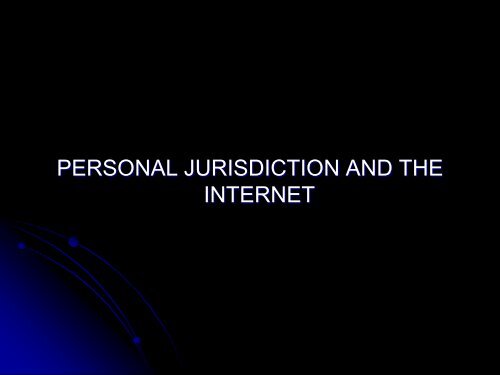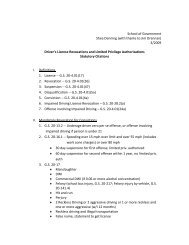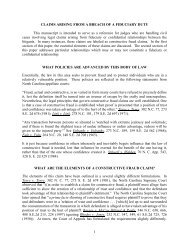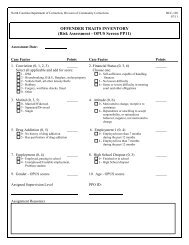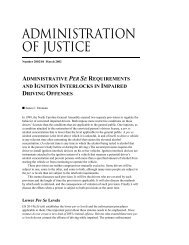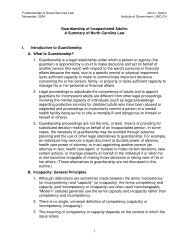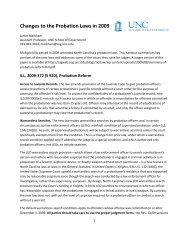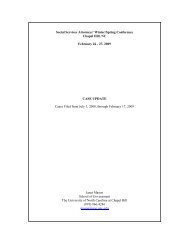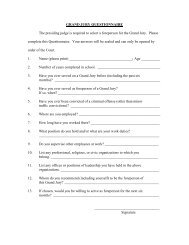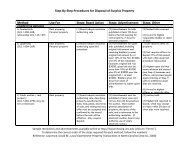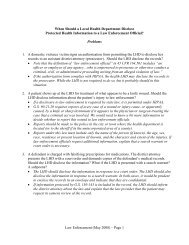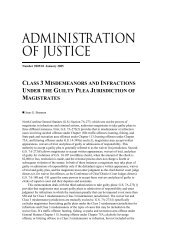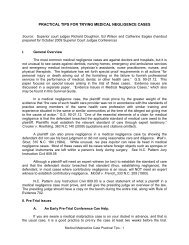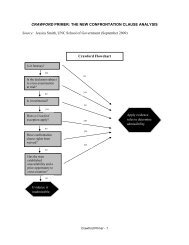Personal Jurisdiction and the Internet
Personal Jurisdiction and the Internet
Personal Jurisdiction and the Internet
Create successful ePaper yourself
Turn your PDF publications into a flip-book with our unique Google optimized e-Paper software.
PERSONAL JURISDICTION AND THE<br />
INTERNET
General Background<br />
• NC Rule 12(b)(2) applies<br />
• May be raised (at pleader’s option) in preanswer<br />
motion or as part of responsive pleading<br />
• If not timely raised, <strong>the</strong>n waived.
General Background<br />
• Doing anything o<strong>the</strong>r than requesting an<br />
extension of time constitutes general<br />
appearance <strong>and</strong> waiver of personal jurisdiction<br />
defense. Judkins v. Judkins, 113 N.C. App. 734,<br />
441 S.E. 2d 139 (1994)<br />
• But once motion raised, D may make a general<br />
appearance <strong>and</strong> o<strong>the</strong>rwise defend on <strong>the</strong> merits.<br />
Lynch v. Lynch, 302 N.C. 189, 274 S.E.2d 212<br />
(1981)
Resolving Motion<br />
• Typically resolved on dueling affidavits w/o live testimony<br />
• Trial court’s findings binding on appeal if supported by<br />
competent evidence<br />
• Judge need not make findings of fact unless requested<br />
by a party; proper facts will be presumed on appeal if<br />
supported by <strong>the</strong> evidence<br />
• Although rare, judge can defer ruling on motion until trial<br />
(Rule 12(d)).
<strong>Personal</strong> <strong>Jurisdiction</strong> Focus<br />
• Has process been served properly?<br />
• May <strong>the</strong> Court assert jurisdiction<br />
consistent with <strong>the</strong> long-arm statute <strong>and</strong><br />
due process?<br />
• Who has <strong>the</strong> burden of proof?
<strong>Personal</strong> <strong>Jurisdiction</strong> Burden of Proof<br />
• Once raised by D, plaintiff has burden to<br />
establish jurisdiction. Brown v. Refuel America,<br />
Inc., ___ N.C. App. __, 652 S.E.2d 389 (2007).<br />
• If complaint alleges sufficient facts to establish<br />
jurisdiction, <strong>the</strong>y are deemed true even if<br />
unverified.<br />
• But if D files affidavit or o<strong>the</strong>r competent<br />
evidence rebutting allegations of jurisdiction, P<br />
must come forward with evidence.
<strong>Personal</strong> <strong>Jurisdiction</strong> (The St<strong>and</strong>ard)<br />
• Does transaction fall within reach of longarm<br />
statute? NCGS 1-75.4<br />
• If so, is exercise of jurisdiction consistent<br />
with due process (i.e. minimum contacts)?<br />
• Almost always collapses into a due<br />
process analysis.
Due Process <strong>and</strong> <strong>Internet</strong> Activity<br />
• The Issue: Just how much activity is<br />
enough?<br />
• Dailey v. Popma, 662 S.E.2d 12 (N.C.<br />
Ct. App. 2008)
Dailey v. Popma<br />
• D, Georgia resident, posted defamatory<br />
statements about P (NC resident) on internet<br />
bulletin board.<br />
• P committed embezzlement <strong>and</strong> <strong>the</strong>ft;<br />
• Is a cheat <strong>and</strong> a liar;<br />
• Is going to be wearing an orange jumpsuit;<br />
• Is a crook;<br />
• Is an a**hole;<br />
• Is a devious con man;<br />
• Is a scumbag; <strong>and</strong><br />
• Is <strong>the</strong> “equivalent” of a molester of boys
Dailey v. Popma<br />
• D moved to dismiss for lack of jurisdiction,<br />
claiming insufficient contacts with NC<br />
• Trial judge grants motion (but makes no<br />
findings)<br />
• Held: Affirmed
Dailey v. Popma<br />
• Complaint alleged D was “engaged in substantial<br />
activities” in NC, including a conspiracy w/ NC resident<br />
to defame P.<br />
• D filed affidavit, stating he had sold NC home in 2005,<br />
had not been present in NC since that time, <strong>and</strong> was not<br />
engaged in any activity in NC when served with<br />
complaint.<br />
• D did admit participating in BB discussions, but denied<br />
any discussions with co-defendant regarding <strong>Internet</strong><br />
postings.<br />
• P did not submit additional evidence.
Dailey v. Popma<br />
• COA Test: Whe<strong>the</strong>r D through his internet activities,<br />
manifested an intent to target <strong>and</strong> focus on North<br />
Carolina citizens<br />
• Not enough that some BB participants were North<br />
Carolinians.<br />
• Nor was it enough that D’s postings affected P in North<br />
Carolina.<br />
• Because P did not meet burden to show materials were<br />
posted with intent to direct content to NC, <strong>and</strong> presented<br />
no o<strong>the</strong>r evidence linking D to NC, dismissal was<br />
appropriate
Blumenthal v. Drudge, 992 F. Supp. 44<br />
(D. DC 1998).<br />
• Defamation case involving statements on<br />
a website published by Matt Drudge of<br />
The Drudge Report.<br />
• Claim was that Blumenthal (a high level<br />
Clinton official) regularly beat his wife.
Blumenthal v. Drudge<br />
• DC Court held it had jurisdiction over D (a<br />
California resident) based on <strong>the</strong> following:<br />
• Injury occurred in <strong>the</strong> District of Columbia;<br />
• D personally emailed his column to a list of DC email<br />
addresses;<br />
• D solicited contributions <strong>and</strong> collected money from<br />
DC Columbia residents;<br />
• Drudge traveled to DC twice to promote his column;<br />
<strong>and</strong><br />
• D.C. residents supplied D with fodder for his business<br />
-- news <strong>and</strong> gossip.
• Havey v. Valentine, 172 N.C. App. 812, 616 S.E.2d 642<br />
(2005).<br />
<strong>Personal</strong> <strong>Jurisdiction</strong> <strong>and</strong> <strong>Internet</strong> Commerce<br />
• <strong>Jurisdiction</strong> will turn on <strong>the</strong> interactive nature of <strong>the</strong><br />
commercial site.<br />
• Trial court should examine level of interactivity <strong>and</strong><br />
commercial nature of <strong>the</strong> exchange of information that<br />
occurs on <strong>the</strong> Web site.<br />
• But if D has no o<strong>the</strong>r connections to NC, <strong>the</strong> mere<br />
posting of an informational or “passive” website will likely<br />
be insufficient to confer jurisdiction.


